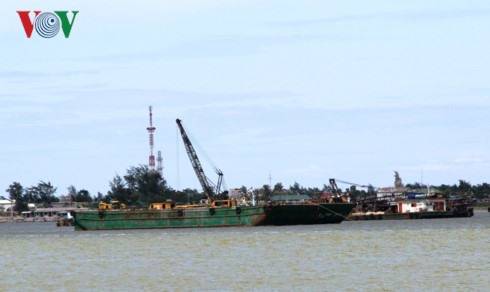 Society
Society

Quảng Trị Province has asked the Duy Tân Mineral Development Co Ltd to temporarily stop exploiting sand from the river in Cửa Việt Town.
 |
| Ships taking sand of the Duy Tân Mineral Development Co Ltd are temporarily stopped from their work for violations. — Photo vov.vn |
QUẢNG TRỊ — Quảng Trị Province has asked the Duy Tân Mineral Development Co Ltd to temporarily stop exploiting sand from the river in Cửa Việt Town.
Since the middle of July this year, the company’s ships have been exploiting sand at the Bắc Cửa Việt Shelter in Gio Linh and Triệu Phong districts.
Local are worried that this could cause erosion, and are opposing the move strongly, with some using their fishing boats to get close to prevent the ship from working.
At a meeting between local authorities and residents on Wednesday, Nguyễn Khai, 41, who lives in Cửa Việt Town in Gio Linh District, said some parts of the embankment of the Hiếu River where the Duy Tân Co Ltd was working had cracked, broken and sank.
“I know the company works without communicating with the community,” Khai said.
Despite disagreements with residents, on July 18, the company’s ship exploited sand right in front of a resident’s house.
Bùi Văn Báo, deputy chairman of the Cửa Việt Town Fatherland Front, said the company collected the sand going against regulations, causing worry in the community.
The company took sand from a very deep area which could cause landslides, he said.
Speaking at the meeting, Hoàng Minh Tân, general director of the Duy Tân Company, admitted the company’s mistake and promised to resolve the matter.
Trần Lương Quang, deputy chairman of the Gio Linh District People’s Committee, said the work of exploiting sand at the Bắc Cửa Việt and Nam Cửa Việt shelters was approved by Quảng Trị Province People’s Committee.
However, supervision of work was unsatisfactory as the company and local authorities did not join hands to work together, he said.
Quang proposed to invite concerned departments and organisations to check and assess the work to correct the faults.
Hồ Xuân Hòe, deputy director of the Quảng Trị Department of Agriculture and Rural Development, proposed that the company supply information and documents about its work to local authorities and residents.
Hòe also asked for compensation for residents. — VNS




